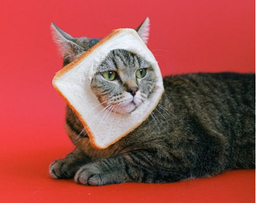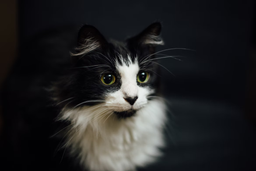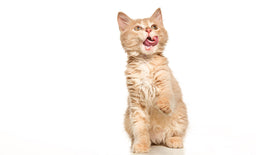Cat food for older cats to keep your senior sprightly
As cats get older, they get mellower, less active, and more comfort-seeking.
Many signs of advancing age are similar to what older humans experience, but the high number of candles on your feline’s birthday cake doesn’t mean you have to start home cooking or buying expensive wet or dry „senior“ food to counteract the effects of ageing.
If you choose a diet that is tailor-made to include high protein volumes, moderate calories, and the kind of nutrients your kitty has evolved to digest easily, you can keep a senior cat in the best possible health.
Untamed has the information you need to choose the healthiest cat food for older cats and keep your senior kitty feeling good and enjoying life!

Should I hunt or just let the mice come to me?
Source: Pixabay
What should the best cat food for older cats achieve?
When you are choosing a diet for your older cat, you want it to:
- Be easily digestible
- Keep kitty’s muscles strong and healthy
- Help maintain the feline’s skin and coat
- Give your cat enough energy
- Support the immune function
- Aid bones and joints to stay strong
These goals are achievable with a diet based on what cats eat in the wild.
What do cats eat in the wild?
Cats are hunters and obligate carnivores.
Their bodies have evolved to process meat, and cats in the wild will typically hunt rodents, birds, and other small mammals. Due to the size of their typical prey, wild cats eat up to 20 times a day, dividing their time between:
- Expending energy through hunting
- Replenishing calories through eating their prey
- Conserving energy by resting
A cat’s prey gives them everything necessary to stay healthy, including:
- Protein
- Fat
- Vitamins
- Minerals
What about domesticated cats?
Domesticated kitties may live a more cosseted life than their wild cousins, but their nutritional needs remain the same.
Senior cats do not change their nutritional needs significantly as they advance in years, but the food they eat may have to be of higher quality to maintain their health and keep them active.
What should cat food for senior cats contain?
As carnivores, cats need:
- Animal protein
- Animal fat
- Vitamins
- Minerals
Animal protein
Proteins are made up of combinations of amino acids—your cat uses these to build and maintain:
- Muscle tone
- Skin and coat
- Organ function
While cats can get certain amino acids from vegetable protein sources, two issues arise:
- Felines can’t process vegetable protein efficiently
- Vegetable protein doesn’t contain enough taurine to cover cats’ needs
As cats grow older, they tend to lose muscle mass—often as a result of years of eating food with high vegetable protein content.
Many cheaper commercial cat food manufacturers use grains and cereals to bulk up their products as these are considerably cheaper than meat.
A senior cat on a diet rich in animal protein should be able to continue maintaining muscle tone, so the mobility won’t be overly impaired as your kitty grows older.
Animal fat
Animal fat is what makes cat food taste good.
Fats also deliver essential fatty acids, such as:
- Arachidonic acid
- Linoleic acid
- Omega-3 and omega-6 fatty acids
These help maintain cell membrane integrity and regulate the healing functions in a cat’s body.
Vitamins
Cats can produce enough vitamins C and K, but all the others must be consumed through food. The essential vitamins and their best sources are:
|
Vitamin type |
Sources |
|
Fat-soluble |
|
|
Water-soluble (B complex and C) |
|
If your senior cat’s diet is meat-based, it should contain all the necessary vitamins.
Minerals
To help with bone strength and structure, a cat’s diet needs to include:
- Magnesium
- Zinc
- Calcium
The amounts required are small, and senior cat diets should not feature any minerals as supplements. An excess of magnesium and calcium can lead to the formation of bladder stones—a frequent condition in senior cats.
What shouldn’t be in food for senior cats?
Some cat food manufacturers adapt their senior cat food to include high volumes of fibre.
Fibre is a generic term for complex carbohydrates, and some manufacturers claim that it can aid digestion in senior cats.
Carbohydrates are metabolised to provide fast-release energy for cats in the form of glucose—typically for short bursts of hunting activity.
The issue with carbs is that any unused glucose is subsequently stored as fat, meaning that senior cats may be prone to putting on unhealthy weight if they take carbs on board.
The ideal make-up of a senior cat diet should consist of:
|
Nutrient type |
Ideal percentage |
|
Animal protein |
More than 50% |
|
Fat |
Up to 20% |
|
Carbs/fibre |
Maximum 3% |

What cat could resist?
Image (c) Untamed
Untamed has the best cat food for senior cats
Untamed believes that senior cats need the same nutrients as their younger counterparts—the reduced energy requirement can be managed by smaller portions.
Here are the pillars of our cat cuisine philosophy:
- Hypoallergenic ingredients
- High protein content
- Vet-formulated recipes
- Human-grade ingredients
- Gentle steaming processes
Hypoallergenic ingredients
Our tasty and nutritious food is hypoallergenic and light on the tummy.
Older cats can suffer from food allergies or digestive problems, so our diets allow you to avoid irritable substances, such as grain and meat derivatives, that disagree with your feline.
High protein content
With up to twice the amount of animal protein that most regular cat foods contain, Untamed can help your senior cat maintain muscle mass and stay active longer.
Our products are grain-free, so your kitty will get a generous dose of pure animal protein in every tin.
Your kitty’s skin and coat will stay in pristine condition, so there should be fewer hairballs and less shedding.
Vet-formulated recipes
Each Untamed recipe has been formulated in collaboration with cat nutritionists to give your older feline the best of the best.
Our products adhere to strict ethical standards and contain no:
- Additives
- Preservatives
- Artificial colourants
- Substances that may be harmful to your cat
Human-grade ingredients
Our ingredients lists are short and defined, meaning we don’t change our formulas according to the market prices, so your cat won’t be unpleasantly surprised every other week!
Gentle steaming process
Although wild cats eat raw food, there’s a massive difference between fresh prey and stored raw meat, which is a perfect nest for various parasites. Untamed dishes are gently steamed to get rid of harmful bacteria.
Aggressive cooking can destroy nutrients, so we ensure our cooking process seals the goodness in for your kitty to enjoy.
We know that the best cat food in the world is useless if your kitty doesn’t like it, so we focus on the taste as much as on the nutritional value. Give Untamed a try and see how your feline friend goes wild for it!

Untamed—the best nutrition for older cats
Image (c) Untamed
Start your Untamed trial today and give your old friend a new lease of life
Your older cat deserves the best, and Untamed is your chance to show your love!
Once we learn a few facts about your kitty, we will design a meal plan perfectly suited to deliver the energy and healthy nutrition needed.
You can order our cat food online and get free shipping—here’s what you need to do:
- Visit our Try Now page
- Tell us more about your kitty
- Select a meal plan and place your order
Once you have seen how your cat loves our meals, we’ll make regular deliveries of healthy cat food to your door to ensure you can serve the best meal every day.
You will start seeing the positive effects in no time:
|
Timeline |
What Untamed will do |
|
Within a week |
|
|
After two months |
|
|
Within four months |
|
|
For life |
|

Still beautiful, eh?
Source: Pixabay
What changes as your cat gets older? Learn a few crucial facts to understand your feline companion better
When your cat turns 11 years old, many bodily functions start to slow down or become less efficient.
According to the most recent scientific research, the life stages a cat goes through are defined as:
|
Life stage |
Age |
|
Kitten |
Up to one year |
|
Young adult |
One to six years |
|
Mature adult |
Seven to ten years |
|
Senior |
11 to 15 years |
|
Super senior |
Over 16 years |
From the age of ten onwards, you may notice the following differences in your kitty:
- Less activity
- More frequent dental problems
- Weight control issues
- Extended sleep patterns
- More frequent health niggles
- Changes in feeding habits
Less activity
Similar to human beings, cats tend to be less playful as they get older because of:
|
Mobility impairment |
Explanation |
|
Arthritis |
|
|
Muscle wastage |
|
|
Reduced joint flexibility |
|
|
Deterioration in eyesight |
|
Many of these conditions can become a vicious circle for senior felines—the less cats move, the faster the age-related diseases will progress.
More frequent dental problems
Your cat may start losing teeth or developing oral problems in later life.
Dental health is closely linked to your feline’s general wellbeing, as their mouth is a perfect breeding ground for harmful bacteria.
Many super senior cats lose all their teeth, which is not a disaster as long as the gums remain healthy. The food will be more difficult to chew, so you may have to:
- Avoid dry biscuits
- Soak food in cat broth
- Choose products that contain cat jelly or cat gravy
Weight control issues
As a senior cat’s digestive system becomes less efficient and mobility becomes impaired, you might notice your kitty’s weight fluctuating more.
Indoor cats, in particular, tend to put on the pounds during the adult phase of their life, and the combination of excess weight, muscle deterioration, and reduced mobility can lead to obesity.
Extended sleep patterns
Resting and sleeping periods will be significantly longer once your cat turns ten. Cats become more sedentary as they grow older, which can have a knock-on effect on their appetite.
Cats eat according to their energy requirements, so if your kitty is not expending energy, the urge to take calories on board will be reduced.
More frequent health niggles
A cat’s immune system will become less efficient over time.
The symptoms you will notice in your older cat may include:
- Frequent sniffles and respiratory infections
- More tummy upsets
- Skin and coat deterioration
- The more frequent onset of urinary tract infections and bladder stones
Changes in feeding habits
Your senior kitty may gradually move away from food that was once the meal of choice, becoming fussier and more sensitive to what’s in the bowl.
If you notice your older cat is starting to refuse particular food, you should offer alternatives to avoid your feline not eating for extended periods because it can lead to rapid weight loss with a potential for liver damage.
All these changes are natural signs of ageing in your cat, but you can address each one with the right choice of cat food.

Yeah, jumped here all by myself!
Source: Pixabay
Besides the best senior cat food, what else can you do for your kitty?
You can help your older cat stay happy and healthy for as long as possible. Here are some practical tips:
- Placing food and water conveniently
- Reducing stress factors
- Rearranging the environment
- Visiting the vet
- Showing more love
Placing food and water conveniently
Whereas kittens are happy to go hunting in different rooms for their food, older cats value routine and predictability.
Keeping their food and water in a quiet, easily accessible place will encourage them to eat. You should also make sure that they don’t have to climb or jump to get to their favourite bowl of Untamed.
Reducing stress factors
Senior cats are prone to stress often triggered by:
- A new rival in the household
- Sudden noises around the house
- Too many visitors invading their space
- Changes in daily routines
Stress may cause them to experience gastrointestinal problems or stop eating, and you should act quickly to calm them down if they get anxious.
Rearranging the environment
If your senior feline has a favourite spot, you should keep it accessible without too much effort.
You may also notice that stairs become insurmountable as your cat advances in age, so you should move anything your kitty needs to a place where no mountaineering is required.
Visiting the vet
Your older cat is prone to many more niggles than a teenager, so regular check-ups are a sensible idea.
You should aim to have your feline looked at every six months—any small issues can be dealt with quickly, and major problems can be identified and tackled before they become serious.
Showing more love
Senior cats can easily slip into lethargy, so you should aim to play with your old feline friend as much as possible.
This has the double-whammy effect of burning up energy and keeping your kitty active while reinforcing the bond between the two of you.
What age-related conditions should you look out for?
Older cats are far more likely to suffer from serious medical conditions. The most common ailments related to advancing age in cats are:
- Kidney failure
- Heart problems
- Hypertension
- Hyperthyroidism
- Cancer
Kidney failure
Kidney failure only becomes apparent when around 75 per cent of the renal function has been lost.
The damage is irreversible, but feeding your cat the best food can maintain their quality of life for as long as possible.
Heart problems
Heart function naturally decreases in older cats, and typical symptoms of cardiac issues are:
- Wheezing or breathing difficulties
- Sudden paralysis of hind legs
- Seizures
- Lethargy
Hypertension
Older cats often suffer from high blood pressure, and the symptoms are similar to those of heart disease.
Hyperthyroidism
If the thyroid gland starts malfunctioning, your older cat may show signs of:
- Overeating
- Hyperactivity
- Excessive thirst
- Weight loss
Vets can treat hyperthyroidism to redress your cat’s hormonal balance.
Cancer
All forms of feline cancer can attack a cat over ten, but regular screening can help spot its onset at the earliest possible stage.
You are the best person to notice if your older cat is unwell.
On top of regular check-ups with the vet, you should watch your kitty for any signs of distress or unusual behaviour.

![Best food for Ragdoll cats in the UK [Broken Down]](http://untamed.com/cdn/shop/articles/featured_best_food_for_ragdoll_cats_uk.jpg?v=1646818249&width=256)

